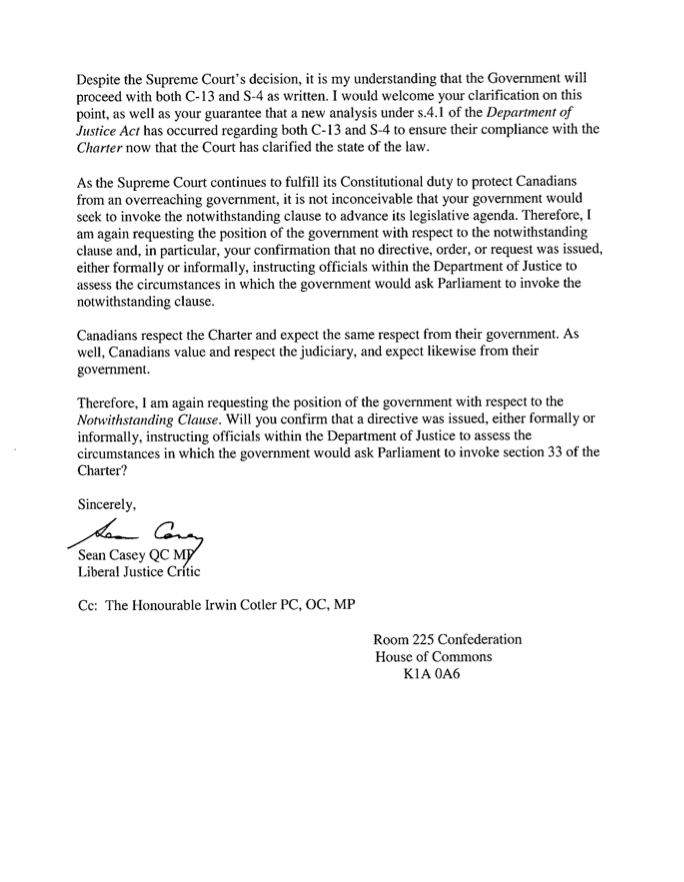Transparency on the Charter’s Notwithstanding Clause
A letter sent yesterday to Justice Minister Peter MacKay by the Liberal Justice Critic Sean Casey raises the possibility that the Conservative government may have issued a directive to the Department of Justice to study the potential suspension of Charter rights.
Last March I wrote that Mr. Casey submitted a series of written questions to the government inquiring about any Conservative policies regarding the use of the Charter’s notwithstanding clause.
By way of background section 33 of the Charter – the ‘notwithstanding clause’ – allows governments to override Charter protections to render unconstitutional laws legal.
This is an exceptional power that has never been used by the federal government.
Casey’s questions were – and are – very relevant given the Conservative government’s history of passing legislation that has been found to violate the basic rights and freedoms guaranteed by the Charter.
The notwithstanding questions are even more important today than they were in March given the Supreme Court of Canada’s decision in R. v. Spencer – a ruling affirming the constitutional protection of internet privacy rights.
The Spencer decision puts the Conservatives’ cyber-bullying and lawful access bill – C-13 – on a collision course with the Charter.
The government’s response to Casey’s questions, however, left much to be desired.
The government said that they have no notwithstanding policy and the clause has never – ever – been used by Parliament.
Importantly, the government refused to disclose if they had requested any analysis regarding the notwithstanding clauses potential use.
Casey following-up in question period asking why the government refused to provide full answers to his questions about the potential use of the Charter override.
Justice Minister Peter MacKay’s response was very troubling, he said:
Mr. Speaker, I have no idea why the member is insisting on the government examining the use of the notwithstanding clause, unless it is based on the fact that it was his government, his party, that was only one who ever used it. Maybe the member has a propensity for the use of the notwithstanding clause.
Not only did MacKay not answer the question but he alleged that the Liberals had used the notwithstanding clause to override the Charter – a stunning allegation – and one that is simply not true.
Yesterday, Casey wrote directly to MacKay to reiterate his request for complete transparency with respect to the notwithstanding clause.
View fullsize


View fullsize


Ironically, as the government increasingly seeks to intrude upon its citizen’s privacy (including improperly collecting information on those who make access to information requests) the government itself is becoming more secretive.
As Mr. Casey says in his letter – Canadians respect the Charter and expect the same respect from their government.
The public deserves to know if the government has issued a directive for its lawyers to study circumstances in which the notwithstanding clause would be used to override the Charter.
Government should set the example for transparency – especially when it comes to issues impacting the basic rights and freedoms of its citizens.